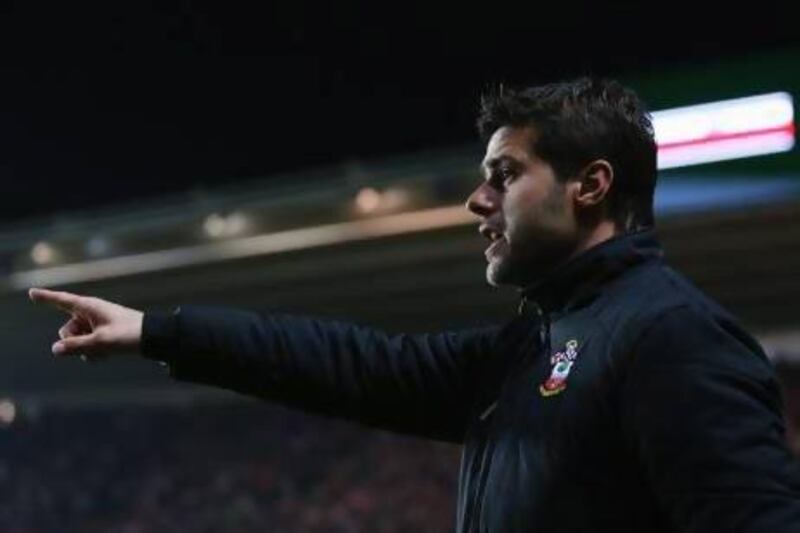It is hard to hate an innocent man. Southampton fans were fuming when their popular manager Nigel Adkins was dismissed last Friday, bewildered when his replacement Mauricio Pochettino was announced immediately.
Not so much dead man's shoes but managerial shoes that nobody apart from Southampton's controversial chairman Nicola Cortese thought needed changing.
With knee-jerk reactions aplenty, some supporters dismissed Pochettino as a foreigner who could not speak English and who had no managerial experience in his new country of work, but it would be wrong to underestimate the former Argentina defender from Santa Fe.
Pochettino is bright enough to improve his English quickly and is using his assistant Jesus Perez to communicate with players.
Pochettino, 40, enjoyed a distinguished career as a ball-playing defender.
He followed in a line of great Argentine centre-halves and was good enough to play 20 times for his country alongside world-class defenders Roberto Ayala and Walter Samuel - though he is best known in England for conceding a penalty by tripping Michael Owen at the 2002 World Cup.
Several of his former international teammates, most notably Diego Simeone at Atletico Madrid, are thriving in coaching.
Southampton hope he can do the same on the south coast after nearly four years in charge at Espanyol, one of the most difficult clubs in Spain to manage.
That Jose Mourinho recommended him to Southampton shows that he was perceived to have done a good job.
A bank of photographers and television cameras were waiting for Pochettino to take the bench before his inaugural game on Monday against Everton.
No fans booed him, though several applauded. In a television interview following the encouraging 0-0 draw, the handsome, well-dressed Southampton manager explained that "the language of football is sometimes more 'gestural' than vocal".
He spoke of his enthusiasm about working in England with the league's youngest squad, of his ambitions.
Pochettino explained that Premier League survival after consecutive promotions is the priority, that he will look into the club's burgeoning academy first to develop more talents, but that "Spain is a market which I know better than any other and is rich in talent".
Pochettino earned a good reputation in Iberia, first for making more appearances for Espanyol than any other foreign player in the 1990s and noughties, then for the way he managed the Barcelona club.
They were bottom of the league, eight points from safety when he arrived in 2009 with ten weeks of the season remaining, but he led them to a 10th-place finish after winning eight of ten games.
In spite of debts and boardroom squabbles, in spite of the death of his captain Dani Jarque and the welcome upheaval of a move to a new stadium, he steered Espanyol to 11th, eighth, eighth and 14th-place finishes - an achievement at a club who had worked through 12 coaches in the previous 11 years. He was the Primera Liga's longest-serving manager before leaving the club last year.
Pochettino promoted young players and was then forced to sell them, twice when Espanyol were on the cusp of top-six finishes. He brought in compatriots, he encouraged aggressive, attacking football.
"He's intelligent, intense and a fully committed disciplinarian," said one member of his back-room staff, who is now considering a move to England with his former boss.
"He doesn't suffer gladly people who don't show the same commitment, but is loyal to those who do. He can inspire players and inspire teams, he's comfortable with the media and he's still very young. That's why he lasted so long and that's why I think he can do well at Southampton."
But what is "well" at Southampton? Fifteenth in the Premier League is exceptional for a club in the third tier in 2011.
Maintaining that level, that famed youth production line - with the likes of Gareth Bale and Theo Walcott as graduates - will be the priority, but Pochettino also has superior experience and contacts from playing in the topflight in Argentina, Spain and France.
He used them to bring in players throughout his time at Espanyol, but by 2012 life at Barcelona's second club had turned sour.
Espanyol were bottom of the league, with one point from their first seven games of this season. That made it just seven points from their previous 35 games and fans tired of Pochettino's excuses. He left the club in November by mutual consent - mutual in so much as there would have been a mutiny had he stayed.
Crowds had slumped and hope was fading. They have improved significantly under his replacement Javier Aguirre.
It was a bad year in an otherwise impressive resume for Pochettino. He will be judged quickly at Southampton and criticised if there is any slip in the high standards set by his predecessor.
He can handle that.
Follow us
[ @SprtNationalUAE ]






